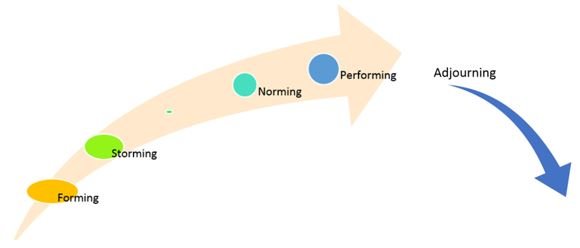Tuckman's Five Stages of Team Development
Tuckman's Five Stages of Team Development
In 1965 Bruce Tuckman presented his description of the four stages of team development and called them 'Forming, Storming, Norming, and Performing'. In the 1970s he added a fifth stage which he called 'Adjourning'.

Forming
This stage denotes a group of people when they first come together to form a team.
They don't know each other, they don't know what the plan is, nor the standards which are expected of them. Team performance is at its lowest point.
Storming
This stage denotes the creation of social hierarchies, where the various personalities jostle with each other to determine their positions in the hierarchy of the group. This is a period of conflict as dominant personalities clash, and submissive personalities submit.
As the social hierarchy takes shape the work begins to flow and the productivity of the team improves.
Norming
This stage denotes the habitualisation of the social structures as people begin to settle down. Each person "knows their place" and what is expected of them. The productivity of the team improves still further.
Performing
This stage denotes the peak performance of the group, where everyone is in their "right place" and each person is perfecting their performance in their particular role, causing the productivity of the team as a whole to reach its zenith.
Adjourning
This stage denotes when the teams project is ended, and the team disbands, either temporarily or permanently. This marks the end of the team, and team performance ceases to exist.
Is the Tuckman's team model of value?
The model is of some value if leaders want to know what to expect.
It is not much value if leaders want to know exactly what to do and say in order to get the best performance from the team, at any stage of the process.
Descriptive verses Prescriptive theories.
Theories come in two main types, Descriptive and Prescriptive.
- Descriptive theories describe what happens.
- Prescriptive theories prescribe what actions we should take, in order to get the best results.
Most people need to know what to do and say, in order to get the best results, so most people need to learn prescriptive models.
Tuckman's model is descriptive, (not prescriptive), it does NOT give definite leadership responses to the five stages.
Consequently, we can categorise the Tuckman's Model as being "Interesting, but of a limited practical value".
Leaders need to learn exactly what to do and say
To get the best results, leaders need to learn exactly what to do and say. For this reason, there are better leadership models than Tuckman.
If you want to learn exactly what leaders should do and say, in order to get the best performance from the team, then please attend our Leadership and Management training course.
Blogs by Email
Do you want to receive an email whenever we post a new blog? The blogs contain article 5-10 minutes long - ideal for reading during your coffee break!
Further Reading in Teamwork
-
How can I get the team to work together?
Do your team members sometimes fight amongst themselves, and tend to work against each other; rather than with each other? If so, what can you do about it?
Read Article > -
Tuckman's Five Stages of Team Development
What is Tuckman's five stages of team development model and is it the best way for leaders to get the best performance from their teams?
Read Article > -
Characteristics of High-performing Teams
To achieve a company's goals, teams must be high-performing. Team Leaders must be aware of the characteristics that teams need to ensure they meet their goals, and how to achieve them.
Read Article > -
Staff development training
Staff development training You need to get the best performance from your staff. Why? Because the future survival and success of your organisation depends on the quality and quantity of their performance. If you get a good performance from the staff, then your chances for great success improve dramatically, and if...
Read Article > -
Building effective teams
Building an effective team An effective team is a valuable asset An effective team has the ability to pool its mental, intellectual, emotional and material resources in such a way, that the performance of the whole is greater than the sum of its parts, meaning: that if the members work together...
Read Article >
Looking for People Management Skills Training?
If you're looking to develop your Teamwork Skills, you may find this People Management Skills Training Course beneficial:
Open Training Course Pricing and Availability
Next Open Course Running tomorrow in London - Central, places available




